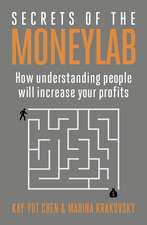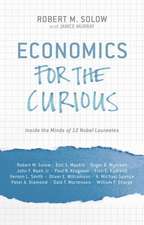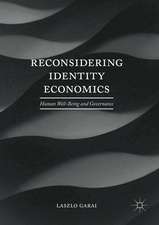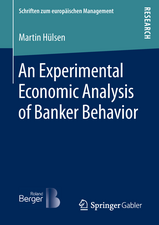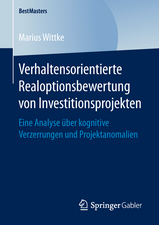Financial Decision Making: Understanding Chinese Investment Behavior
Autor Ning Zhuen Limba Engleză Hardback – 15 mai 2017
It draws on a large body of literature, from psychology and social psychology to, most importantly, behavioral economics and behavioral finance. It also looks at the progress in behavioral finance research over recent decades and includes research outputs based on retail and institutional investors from the United States, China, and many other international financial markets.
The book focuses on China’s financial reforms and economic transition and includes many cases from that country to highlight the importance of behavioral finance and investor education. It therefore provides much needed in-depth understanding of the Chinese capital market.
| Toate formatele și edițiile | Preț | Express |
|---|---|---|
| Paperback (1) | 459.36 lei 43-57 zile | |
| Taylor & Francis – 16 mai 2017 | 459.36 lei 43-57 zile | |
| Hardback (1) | 1104.45 lei 43-57 zile | |
| Taylor & Francis – 15 mai 2017 | 1104.45 lei 43-57 zile |
Preț: 1104.45 lei
Preț vechi: 1346.89 lei
-18% Nou
Puncte Express: 1657
Preț estimativ în valută:
211.36€ • 219.85$ • 174.49£
211.36€ • 219.85$ • 174.49£
Carte tipărită la comandă
Livrare economică 14-28 aprilie
Preluare comenzi: 021 569.72.76
Specificații
ISBN-13: 9781138658165
ISBN-10: 1138658162
Pagini: 136
Ilustrații: 18
Dimensiuni: 156 x 234 x 13 mm
Greutate: 0.32 kg
Ediția:1
Editura: Taylor & Francis
Colecția Routledge
Locul publicării:Oxford, United Kingdom
ISBN-10: 1138658162
Pagini: 136
Ilustrații: 18
Dimensiuni: 156 x 234 x 13 mm
Greutate: 0.32 kg
Ediția:1
Editura: Taylor & Francis
Colecția Routledge
Locul publicării:Oxford, United Kingdom
Public țintă
Postgraduate, Professional, and UndergraduateCuprins
1 Disappointing performance
2 Unsettled investors
3 Under-diversified portfolios
4 Mistimed timing and misguided stock picking
5 Disappointing mutual fund performance
6 Irrational mind
7 Behavioral biases and investment decision making
8 Difficult history
9 Learning by investing
10 Over-confident CEOs
11 Catering CEOs
12 Risk management! Risk management!
13 Regulation and government decision making: the behavioral biases of governments and regulators
14 How to reform
2 Unsettled investors
3 Under-diversified portfolios
4 Mistimed timing and misguided stock picking
5 Disappointing mutual fund performance
6 Irrational mind
7 Behavioral biases and investment decision making
8 Difficult history
9 Learning by investing
10 Over-confident CEOs
11 Catering CEOs
12 Risk management! Risk management!
13 Regulation and government decision making: the behavioral biases of governments and regulators
14 How to reform
Recenzii
'Professor Ning Zhu’s new book is a must read for those who want to understand the behaviors behind Chinese investment and its decision making. Continued development and understanding of these factors behind investments is essential for all readers whether the causal investor or the investment professional. I find this book well-written, make interesting points and highly relevant.' — David Yu, CFA, Adjunct Professor of Finance, New York University Shanghai and Managing Director & Chief Investment Officer, Inception Aviation
'Professor Zhu provides a compelling and easy to read analysis on the dangers of investing that many other investment books fail to appreciate. His numerous historical examples and other research provides a useful perspective and antidote to common fallacies in investor thinking. The timeliness of the topic makes it a must read for Chinese investors in particular who are now engaged in financial market activities more than any time in its history. This book is definitely a worthwhile addition to any syllabus covering investment topics.' —Ann Lee, Adjunct Professor of Economics and Finance, New York University
'One of the things that sets this book apart is that it takes many different perspectives. While much has been written about the failures of individual decision-making, the implications of behavioral finance extend to the corporate sector and to the regulatory and government sectors as well. Professor Zhu shows us how decision-making in all of these arenas is actually influenced by a common set of psychological tendencies that, in turn, tie back into fundamental human nature. The book demonstrates not only why behavioral finance is important, but it also shows how our personal analytical limitations can be overcome, once we recognize them.' — William N. Goetzmann, Edwin J. Beinecke Professor of Finance and Management Studies; Director of the International Center of Finance, Yale School of Management, Yale University
'Professor Zhu provides a compelling and easy to read analysis on the dangers of investing that many other investment books fail to appreciate. His numerous historical examples and other research provides a useful perspective and antidote to common fallacies in investor thinking. The timeliness of the topic makes it a must read for Chinese investors in particular who are now engaged in financial market activities more than any time in its history. This book is definitely a worthwhile addition to any syllabus covering investment topics.' —Ann Lee, Adjunct Professor of Economics and Finance, New York University
'One of the things that sets this book apart is that it takes many different perspectives. While much has been written about the failures of individual decision-making, the implications of behavioral finance extend to the corporate sector and to the regulatory and government sectors as well. Professor Zhu shows us how decision-making in all of these arenas is actually influenced by a common set of psychological tendencies that, in turn, tie back into fundamental human nature. The book demonstrates not only why behavioral finance is important, but it also shows how our personal analytical limitations can be overcome, once we recognize them.' — William N. Goetzmann, Edwin J. Beinecke Professor of Finance and Management Studies; Director of the International Center of Finance, Yale School of Management, Yale University
Descriere
This book sheds insight into financial decision making and lays down the major biases in human behavioral decision making, such as over-confidence, naïve extrapolation, attention, risk aversion, and how they lead investors and corporations to make considerable mistakes in investment.
This book focuses China’s financial reforms and economic transition and uses many cases and results on China to highlight the importance of behavioral finance and investor education. It provides the much needed in-depth understanding of the Chinese capital market.
This book focuses China’s financial reforms and economic transition and uses many cases and results on China to highlight the importance of behavioral finance and investor education. It provides the much needed in-depth understanding of the Chinese capital market.







